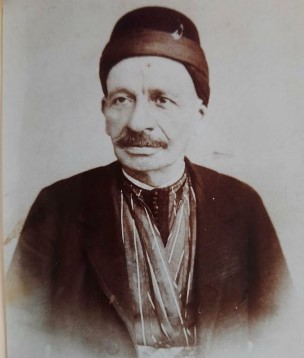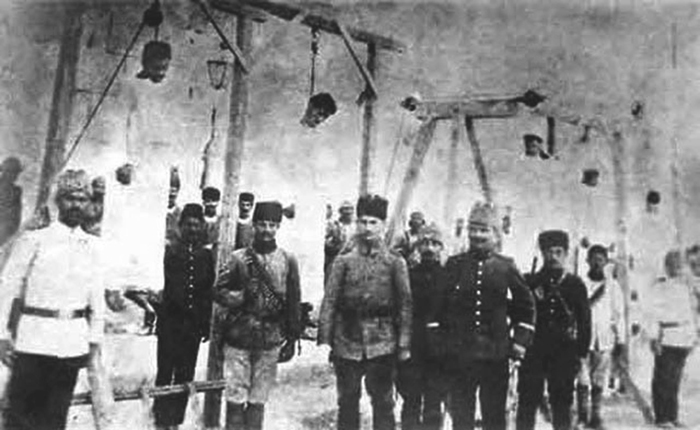Mary 'Ajami on:
[Wikipedia]
[Google]
[Amazon]
Mary Ajami (
 Ajami was born to a large
Ajami was born to a large
 During World War I, the journal suspended its publication and Ajami wrote editorials for the
During World War I, the journal suspended its publication and Ajami wrote editorials for the
 Ajami was somewhat of an anomaly for her time, and like her more famous peer
Ajami was somewhat of an anomaly for her time, and like her more famous peer
The Arab Human Development Report:Towards the Rise of Women in the Arab World
Arabic
Arabic (, ' ; , ' or ) is a Semitic language spoken primarily across the Arab world.Semitic languages: an international handbook / edited by Stefan Weninger; in collaboration with Geoffrey Khan, Michael P. Streck, Janet C. E.Watson; Walter ...
: ماري عجمي) (1888 – December 25, 1965) was a Syrian feminist and pioneering Arabic-language writer who launched the first women's periodical in Western Asia
Western Asia, West Asia, or Southwest Asia, is the westernmost subregion of the larger geographical region of Asia, as defined by some academics, UN bodies and other institutions. It is almost entirely a part of the Middle East, and includes Ana ...
and North Africa
North Africa, or Northern Africa is a region encompassing the northern portion of the African continent. There is no singularly accepted scope for the region, and it is sometimes defined as stretching from the Atlantic shores of Mauritania in ...
called ''Al Arus'' (Arabic: the Bride).
Biography
 Ajami was born to a large
Ajami was born to a large Greek Orthodox
The term Greek Orthodox Church ( Greek: Ἑλληνορθόδοξη Ἐκκλησία, ''Ellinorthódoxi Ekklisía'', ) has two meanings. The broader meaning designates "the entire body of Orthodox (Chalcedonian) Christianity, sometimes also cal ...
Christian family in 1888 and raised in Damascus, modern-day Syria. Her father was Abdallah al-Ajami, a prominent Damascene landowner, businessman and influential figure of the church, whilst her mother was a woman of Greek descent. She spent her formative years in Damascus, where she received an education from Irish and Russian missionary schools, before studying nursing and graduating from the Syrian Protestant College in Beirut
Beirut, french: Beyrouth is the capital and largest city of Lebanon. , Greater Beirut has a population of 2.5 million, which makes it the third-largest city in the Levant region. The city is situated on a peninsula at the midpoint o ...
in 1906. Even while she was a student at the Syrian Protestant College, she began teaching as a visiting teacher in Zahlé, Lebanon.
After graduation, she began teaching in Port Said, Egypt. The following year she moved to a school in Alexandria, Egypt
Alexandria ( or ; ar, ٱلْإِسْكَنْدَرِيَّةُ ; grc-gre, Αλεξάνδρεια, Alexándria) is the second largest city in Egypt, and the largest city on the Mediterranean coast. Founded in by Alexander the Great, Alexandria ...
before returning to her native Damascus to teach English to students attending the Russian military school there.
Journalist
She was a writer frequently publishing her work under the pseudonym of ''Layla'' (her mother's name) for fear of reprisals. Ajami began freelance writing about social and political topics for Muhammad Kurd Ali's weekly newspaper ''Al Muqtabas'' and in 1910 began her own periodical ''Al 'Arus'' (Araic: the Bride), which was the first Syrian publication to defend women's rights, which ran for 11 years. As the editor-in-chief, she was able to employ a few educated girls to serve on its editorial board, although she had the young women sign their journalist contributions under an assumed name for their protection from harassment in Syria's male-dominated society. Ajami's first editorial in the new periodical was a declaration, "a manifesto for Syria's emerging feminist movement, dedicating her work..."To those who believe that in the spirit of women in the strength to kill the germs of corruption, and that in her hand is the weapon to rend the gloom of opposition, and in her mouth the solace to lighten human misery."She personally raised the necessary funds to support the journal, which soon became recognized as "one of the highest quality periodicals in the Arab world." While the journal was a rousing success among the country's female educated elite, it was scorned by conservative Muslim readers who condemned its messages and sought to abolish it.
 During World War I, the journal suspended its publication and Ajami wrote editorials for the
During World War I, the journal suspended its publication and Ajami wrote editorials for the Egyptian
Egyptian describes something of, from, or related to Egypt.
Egyptian or Egyptians may refer to:
Nations and ethnic groups
* Egyptians, a national group in North Africa
** Egyptian culture, a complex and stable culture with thousands of years of ...
newspaper ''al-Ahrar'' (Free Patriots), and ''al-Islah'' (Reform), an Arabic newspaper based in Buenos Aires, Argentina.
She was fiercely opposed to the Ottoman Empire
The Ottoman Empire, * ; is an archaic version. The definite article forms and were synonymous * and el, Оθωμανική Αυτοκρατορία, Othōmanikē Avtokratoria, label=none * info page on book at Martin Luther University) ...
, especially after 1915 when authorities in Beirut, executed Ajami's fiancé, Petro Pauli, for criticizing the occupying military regime of Sultan Mohammed Rashad V.
From 1918 to 1920 she headed the Christian Women's Club, an organization aimed at promoting Arabism amongst the Christians of Damascus and Beirut.
In 1919, she officially restarted publication of ''al-Arus'', but not without controversy. In 1920, religious leaders demanded that Ajami be brought to trial for promoting heresy by publishing a story supporting civil marriage.
Suffrage campaigner
In 1920, after the Ottoman Empire collapsed, she founded of the Damascus Women's Literary Club and spearheaded the movement to give women the right to vote, going directly to King Faysal I, the first post-Ottoman Syrian ruler. In that same year, she established a weekly salon in her home that was well attended by both men and women who took that opportunity to discuss politics, philosophy and religious affairs. Her salon was groundbreaking at the time, because allowing men and women to engage in discussions together was unheard of in Syria. In her own words, she described the salon's aim as "reviving female intelligentsia." Ajami's successful career was tempered by elements of tragedy in her personal life. For many years, she longed to continue her studies abroad, but her father's death and the outbreak of war prevented her from doing so. Joseph T. Zeidan reminds us that her achievements "must be assessed in the light of formidable obstacles she encountered while struggling to keep her journal alive, not least of which were her father's attempts to persuade her to quit."Later years
 Ajami was somewhat of an anomaly for her time, and like her more famous peer
Ajami was somewhat of an anomaly for her time, and like her more famous peer May Ziadeh
May Elias Ziadeh ( ; ar, مي إلياس زيادة, ; 11 February 1886 – 17 October 1941) was a Lebanese-Palestinian poet, essayist, and translator, who wrote many different works both in Arabic and in French.
After attending school in ...
, Ajami never married. She died on December 25, 1965.
Tributes
Fares al-Khoury, the two-time prime minister of Syria, compared Ajami to her famous contemporary May Ziadeh (1886-1941) when he said in verse form,My friends take it from me, I can say that Mary Ajami can match with May Ziadeh For skill and ingenuity.
Selected publications
*''Al-Majdaliyya al-Hasna (the Beautiful Magdelene) (1913) *''Mukhtarat min al-Sh'r'' (Selected Poems) (1944)See also
*Women's literary salons and societies in the Arab world
The tradition of women's literary circles in the Arab world dates back to the pre-Islamic period when the eminent literary figure, Al-Khansa, would stand in the 'Ukaz market in Mecca, reciting her poetry and airing her views on the scholarship of ...
The Arab Human Development Report:Towards the Rise of Women in the Arab World
References
External links
* {{DEFAULTSORT:Ajami, Mary Members of the Greek Orthodox Church of Antioch Syrian Christians 1888 births 1965 deaths Syrian salon-holders Syrian women poets Syrian nationalists American University of Beirut alumni Writers from Damascus Syrian suffragists Syrian women journalists 20th-century Syrian women writers 20th-century Syrian writers Syrian magazine founders